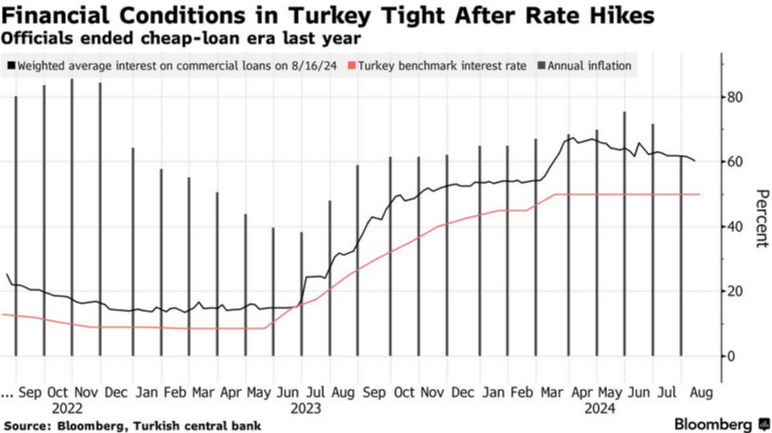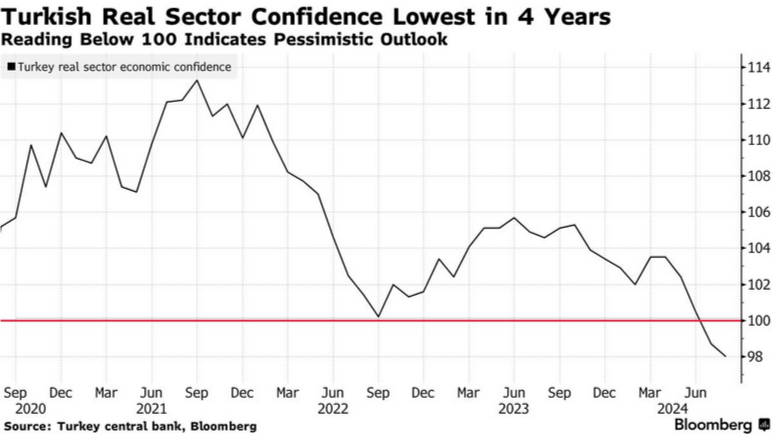Turkish firms struggle as high inflation and 50% interest rates squeeze businesses
 Grand Bazaar in Istanbul, Türkiye (Photo via LWYang via Flickr)
Grand Bazaar in Istanbul, Türkiye (Photo via LWYang via Flickr)
According to Bloomberg’s report, Turkish companies are under significant pressure due to soaring inflation, escalating costs, limited access to finance, and weakening demand. The clothing and textile sectors are particularly hard-hit, as businesses grapple with the economic challenges.
Clothing and textile industries hit hard by economic turbulence
Monetary officials in Türkiye are battling to control annual price increases that have surged beyond 60%, twelve times higher than the official target. The Central Bank of Türkiye has maintained its benchmark interest rate at 50% since April, marking the highest level in nearly two decades and intensifying the burden on businesses.
“We are in a groundswell,” said Ramazan Kaya, head of the Turkish Clothing Industrialists Association, during a statement in Istanbul last week. “We used to come out of them quicker in the past.”
For export-driven sectors like apparel manufacturing, challenges are compounded by declining demand from European buyers—Türkiye’s largest export market—and the perceived overvaluation of the lira. Although the currency has depreciated by 13% against the dollar this year, exporters argue that it remains too strong to be competitive.

Financing woes lead to business closures
While industry leaders recognize the necessity of taming inflation, businesses are rapidly depleting their cash reserves, according to Kaya. Access to financing has become either inaccessible or prohibitively expensive, exacerbating the situation.
The Union of Chambers and Commodity Exchanges of Türkiye (TOBB), the nation’s largest business group, reported that nearly 40% more firms shut down in July compared to the same period last year.
Türkiye’s economic outlook: A challenging road ahead
Upcoming GDP data, expected to be released on Monday, is anticipated to show a 0.5% contraction in the second quarter, following a 2.4% growth in the previous quarter, according to a Bloomberg survey. The key challenge for Finance Minister Mehmet Simsek is to bring down inflation without causing excessive harm to the economy.
The real estate sector’s confidence has been declining for four consecutive months, reaching its lowest point since 2020 in June. Contributing factors include drops in export orders, employment, production volume, capital investments, and projections for the next three months, as reported by the central bank.

Central Bank policies and future economic projections
Turkish companies previously benefited from one of the world’s most negative real interest rates, with access to single-digit loans despite inflation rates soaring above 80%. This dynamic shifted in May last year when Turkish President Recep Tayyip Erdogan endorsed a more investor-friendly economic program, aiming to stabilize prices through higher interest rates.
Türkiye’s Central Bank Governor Fatih Karahan, a former Federal Reserve Bank of New York policy adviser, oversees the policy changes. Commercial loans have been capped at a monthly rate of 2% to maintain tight financial conditions, with the weighted average interest rate staying above 60% since March.
Türkiye’s annual growth is projected to be 3.2% in 2024 and 3.4% in 2025, according to Bloomberg Economics, a significant drop from the over-5% averages observed in the decade leading up to the COVID-19 pandemic. Turkish authorities are reportedly preparing to lower the official growth forecasts for this year and next.
Rising unemployment and declining production capacity
Seasonally-adjusted unemployment rose to 9.2% in June, the highest in a year, sparking concerns of further increases as businesses face high labor costs and dwindling equity. “We see that 400-500 of our firms have lost their production capacity,” said Berke Icten, head of the Türkiye Footwear Industrialists’ Association.
Recent data indicate that capacity utilization—a critical measure of potential output levels—declined in both July and August. “Demand indicators in the second quarter imply a slowdown compared to the first quarter, albeit it’s still at inflationary levels,” Fatih Karahan, Governor of the Central Bank of the Republic of Türkiye, stated in August.



